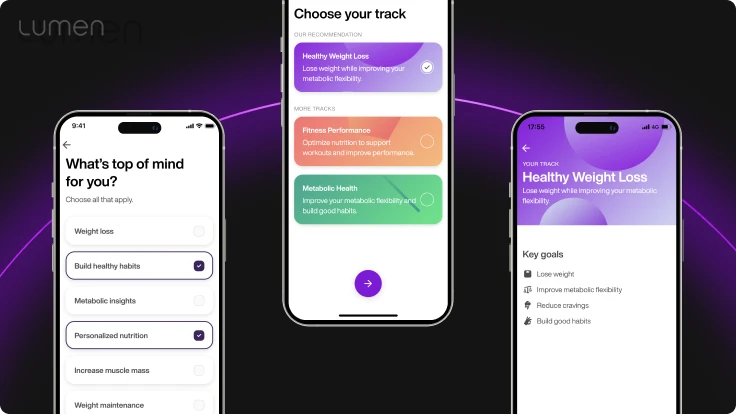Carb cycling meal plan: Personalize your carbs

Carbs are your energy, not your enemy
Carbohydrates are essential to our body. Mitochondria, our cells’ powerhouses, use them as a primary energy source, influencing everything from cellular function to metabolic health.
However, fad diets, rising food trends, and ultra-processed foods packed with simple carbs have turned carbs into villains and distorted our views of them. Cutting out carbs entirely is often promoted as a solid path to weight loss and health, giving rise to long-term low-carb diets and ketogenic foods. As a result, many find it confusing to determine which carbohydrates to eat, the right amount to consume, when to eat them, or whether to eat carbs at all.
“Many assume that a healthy lifestyle requires eliminating carbs,” shares Lumen Nutritionist Abigail Markman. “However, confining ourselves to carb-restrictive diets for prolonged periods might inadvertently hamper our metabolic flexibility and prevent us from reaching our health goals.”
While overeating carbs, especially ultra-processed carbs, can lead to blood sugar spikes and insulin resistance, demonizing them oversimplifies nutrition and can lead to unhealthy eating habits, bypassing the benefits healthy, complex carbs provide.

This is why carb cycling has emerged as a sustainable and balanced nutrition strategy that alternates between high- and low-carb days to optimize carbohydrate intake, improve fat burn, boost energy, and support muscle growth.
According to cardiovascular research scientist Dr. James DiNicolantonio, “Most healthy adults should consume at least 40 grams of carbohydrates per day, and between 40 to 150 grams of carbs per day is likely optimal for most people.”
Let’s find out more.
How does carb cycling affect your metabolism?
Carb cycling pushes the mitochondria to fat burn when low on carbs, while high-carb days allow the body to replenish glycogen, your body’s carb stores. This can positively influence metabolic flexibility, which is the ability of your mitochondria to easily shift between carb and fat burn1. Metabolic flexibility has many benefits, including easier weight management, improved body composition, increased energy levels, and better sleep.

What happens in your body on high-carb days?
When carbohydrates enter our system, they are broken down into simpler sugars like glucose, which raises blood glucose levels and prompts the pancreas to release insulin. Insulin is essential for regulating blood sugar and facilitating glucose uptake into cells, where it can be used for energy or stored as glycogen in the liver and muscles23.
Insulin sensitivity refers to how responsive your cells are to insulin and is crucial in determining how efficiently this process occurs. When you have good insulin sensitivity, your body needs less insulin to manage blood sugar, which allows glucose to be efficiently absorbed by your cells. Increasing carb intake can also lead to an upregulation of hormones like leptin, which increases satiety45.

After a period of low-carb intake, high-carb days can boost metabolism due to an increase in the thermic effect of feeding (TEF)6, which is when your metabolic rate increases due to the energy required for digestion, absorption, and storage of nutrients.
Out of the three macronutrients, protein has the highest TEF, followed by carbs and fats7.
To compare:
Thermic effect of protein: 15-30%
Thermic effect of carbohydrates: 5-10%
Thermic effect of fat: 0-3%
The body’s ability to manage carbohydrates is vital for maintaining energy balance and promoting metabolic flexibility. High-carb days are great when synced with high-intensity training, like weightlifting and sprinting, as they replenish your glycogen stores and enable your muscles to uptake carbs and use them for energy efficiently8. This promotes muscle growth and prevents muscle breakdown because you’ll be properly fueled for your workout. The process is important because muscles are densely packed with mitochondria. As you build more muscle through proper nutrition and exercise, you can increase your body’s fat-burning capacity, even at rest, due to a higher basal metabolic rate9.
After high-intensity workouts, your body enters a recovery phase, replenishing glycogen stores and repairing muscle tissue. During this time, it primarily burns carbs for energy. Post-workout meals rich in carbohydrates help restore glycogen levels10, preparing the body for future activity and aiding muscle recovery11.
Aim to consume your post-workout meal within 2 hours of your workout to optimize recovery.
Protein: Choose lean sources like chicken, fish, or tofu.
Carbohydrates: Opt for complex carbohydrates like lentils, quinoa, squash, and brown rice.

What happens in your body on low-carb days?
On a low-carb or ketogenic diet, your body enters a state of fat burn. This means your mitochondria use fat as a primary fuel source12.
Low-carb days help you tap into your glycogen reserves and fat stores for energy instead of relying on carbs for fuel. This can improve metabolic flexibility, weight loss, and body recomposition efforts. Low-carb days are great when synced with rest days or low-intensity training, like zone 2 walking, as your body won’t have a high-carb demand.

While shifting to low-carb eating is beneficial for short spurts, long-term low-carb and keto dieting for months may impact your glycolytic pathways, making it difficult for your body to process carbohydrates efficiently when consumed13.
Prolonged low-carb diets can also reduce serum T3 (triiodothyronine), a thyroid hormone that regulates metabolism, energy, heart function, and body temperature14. This is important, as T3 is the active thyroid hormone you need to increase in hypothyroid conditions. By incorporating high-carb days, carb cycling can help maintain or boost levels of this hormone, leading to better metabolic function.
Biohacker Dave Asprey explains, “People with the healthiest metabolisms build this amazing capacity to swing their biology in one direction or the other. A better metabolism means more energy, better emotional regulation, and overall health.”
How to personalize your carb cycling plan
Carb cycling is not a one-size-fits-all approach. To succeed with carb cycling, it’s essential to understand your body’s specific metabolic needs and consider your personal health goals. One study15 found that people who followed diets tailored to their needs and preferences were more likely to adhere to them and lose weight.
Using a metabolism tracker like Lumen can help you identify which days to eat low carb versus high carb based on your real-time metabolic measurements. When you take a breath measurement and determine whether you’re burning carbs or fats for fuel, Lumen provides a nutrition plan for the day with a breakdown of how many carbs, proteins, and fats you should consume to reach metabolic flexibility.
For example, during high-carb days (“Boost” days at Lumen), which are only given after three consecutive days of waking up in fat burn, you can train your metabolism to use carbs to fuel workouts and replenish glycogen stores, supporting muscle growth. On low-carb days, you promote fat loss by encouraging the body to burn stored fat for energy.
“After decades of yo-yo dieting and keto, one of the things that I had in mind was wanting to carb cycle. I found Lumen, and it was like, wow, this is fantastic. This is exactly what I need. Lumen was instrumental in addressing goals in terms of being able to start eating carbs again.”
Careen, 63, California
Carb cycling meal plan example
Here’s a three-day example of how you could potentially eat on low-carb, medium-carb, and low-carb days. Individual needs may vary based on activity level, body weight, metabolism, and health goals.
Day 1 (High-carb day: Weightlifting workout)
Total carbs for the day: ~200-250 grams
Breakfast: Scrambled eggs with spinach, whole grain toast, and a side of avocado
Carbs: ~50 grams (toast and spinach)
Lunch: Grilled chicken breast, quinoa, roasted sweet potatoes, and steamed broccoli
Carbs: ~60 grams (quinoa and sweet potatoes)
Snack: Greek yogurt with berries and granola
Carbs: ~30 grams (berries and granola)
Dinner: Baked salmon, brown rice, and sautéed mixed vegetables
Carbs: ~60-70 grams (brown rice and veggies)
Day 2 (Moderate-carb day: Long-distance cycling)
Total carbs for the day: ~100-150 grams
Breakfast: Smoothie with almond milk, protein powder, half a banana, and spinach
Carbs: ~30 grams (banana and spinach)
Lunch: Turkey wrap with whole wheat tortilla, hummus, and veggies
Carbs: ~40-50 grams (whole wheat tortilla and hummus)
Snack: Apple slices with almonds
Carbs: ~25 grams (apple)
Dinner: Grilled shrimp, sweet potatoes, and asparagus
Carbs: ~40 grams (sweet potatoes)
Day 3 (Low-carb day: Rest or zone 2 walking)
Total carbs for the day: ~50-75 grams
Breakfast: Omelette with mushrooms, spinach, and a slice of turkey bacon
Carbs: ~10 grams (veggies)
Lunch: Grilled chicken salad with mixed greens, avocado, cucumbers, and olive oil
Carbs: ~10-15 grams (low-carb veggies)
Snack: Celery sticks with almond butter
Carbs: ~5 grams
Dinner: Grilled steak with roasted cauliflower, zucchini, and mixed greens
Carbs: ~10-15 grams (low-carb veggies)
For more ideas, download our carb cycling meal plan.
Personalize your carb cycling meal plan
Carb cycling helps you strategically alternate between high- and low-carb intake based on your goals, activity levels, and real-time metabolic measurements. This helps you become more metabolically flexible, enabling your body to seamlessly transition between burning carbs and fats for fuel.

The best way to get started with carb cycling is to measure your metabolism and receive personalized nutrition plans and meal suggestions based on your real-time metabolic measurements.
“I got so much added value (other than weight loss) through the Lumen community. I have learned that I should not be working out as hard as I did. When I started eating more of the right food and exercising less, the fat came off, and I have more muscle and energy.”
Deanna, 54, Mexico
People also asked:
1. How many carbohydrates do I need per day?
Your carb intake can vary based on your unique metabolic health, activity levels, and goals. Use a metabolism tracker like Lumen for personalized daily macro recommendations and nutrition plans based on your real-time metabolic data.
2. What are examples of high-quality carbs?
High-quality carbohydrates are complex, nutrient-dense, and often high in fiber. Examples include whole grains, vegetables, and legumes. These foods help provide steady energy, prevent blood sugar spikes, and promote a healthy gut microbiome.
3. What happens if you eat too little carbs?
When you don’t eat enough carbs for a long time, your mitochondria won’t have the reserves to provide energy boosts, leaving you feeling sluggish. Plus, constantly relying on fat for energy can make your body less efficient at using carbs, leading to metabolic inflexibility and quick weight gain when you eat carbs.

Disclaimer
The information Lumen provides is for educational and informational use only. You should seek the advice of your physician or other healthcare providers with any questions regarding your health.







 Digital download
Digital download 


